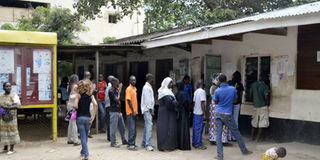State has put unjust obstacles in process of getting an ID card

Kenyans queue to collect their national ID cards at a registration office. Living without an ID card in Kenya is like being stateless. FILE PHOTO | KEVIN ODIT | NATION MEDIA GROUP
What you need to know:
- National identity card conveys citizenship and nationality, in a world that is increasingly more xenophobic and nationalistic in the worst exclusionary sense.
- Without the national identity card one is easy prey to the predators in our security services.
- The ID card determines if you can attend a tertiary education institution; get a formal job; open a bank account, get treatment in hospitals or acquire a driver’s license.
No document is as important in Kenya as the national identity card (ID). It conveys citizenship and nationality, in a world that is increasingly more xenophobic and nationalistic in the worst exclusionary sense.
The ID card is the gateway to almost everything: it determines if you can attend a tertiary education institution; get a formal job; open a bank account, get treatment in hospitals or acquire a driver’s license. Without it, one is easy prey to the predators in our security services!
Often overlooked, is the fact that the ID card is merely a confirmation of one’s right to citizenship: Citizenship is granted by the Constitution, not the ID card or passport. And as a right, it should not be dispensed like a favour by authorities.
While there is a need to ensure that genuine Kenyans acquire one, it is crucial that the verification does not become an effective restriction to the right to citizenship that is more important than the right itself.
Emphasizing restrictions turns the right into a privilege, to be dispensed at the discretion of authorities.
From the beginning of this year, InformAction teams across the country have been filming and talking with ordinary people at the grassroots about their experiences in acquiring ID cards.
What initially started as monitoring of the IEBC’s Mass Voter Registration exercise soon morphed into visual documenting of the process of getting ID cards across the country.
It soon became clear that the grand plans of the IEBC to register millions of new voters would fail, partly because so many people have no IDs and because most IEBC officials are reluctant or unwilling to use the ID waiting cards as proof of citizenship.
The results of the research, released yesterday by InformAction, are alarming and make for grim reading.
Ostensibly to ensure that anyone getting an ID card is indeed a Kenyan, the regime uses a vetting process that effectively discriminates against those Kenyans born in “border regions” which are the ones contiguous to our neighbouring states.
But the upshot of this is that only residents of Nairobi and Central, of the eight regions are exempted from the more invasive, longer and tedious vetting that others have to undergo.
RIGOROUS VETTING PROCESS
But even in these two non-border regions, there is additional vetting based on the ethnicity of the person seeking an ID card. Thus someone of Borana heritage who was born and bred in Kiambu will need to go through all the three levels of vetting, especially if they are Muslim, quite unlike their colleagues with Gikuyu heritage who only need a birth certificate and a parent’s ID card.
Level two of vetting for non-border regions and ethnic groups includes a letter from the chief or assistant chief.
Level three is defined as “special security” vetting and often entails confirmations by elders, police background checks and sometimes, confirmation by grandparents, no matter how feeble they may be.
You can imagine the number of extortion points in these extra levels! And imagine how hard it is for someone from a nomadic community living in an urban area to look for elders who could easily be more than 200km away.
Also interesting was the finding that internal borders are now getting more significant in the issuance of ID cards, with non-natives treated as “outsiders”.
Thus people with origins in Laikipia but living in neighbouring Nyeri are vetted more strenuously and invasively even though Laikipia is not contiguous to any neighbouring state.
The sum effect of these discriminatory policies is that it is “very fast and very easy” for people of Gikuyu origin especially to acquire ID cards, while it is an uphill battle for those in northern Kenya to get one, which can take between two to three years, if one is lucky.
The import of this discrimination on voter registration, and thus a credible election, is obvious. And that should alarm us all.
Unless the regime acts as swiftly as it did for the Makonde people to ensure that all Kenyans can get ID cards as easily and as fast as those in Central, we will still be a long way from credible and fair elections, with all its attendant and dangerous consequences.





